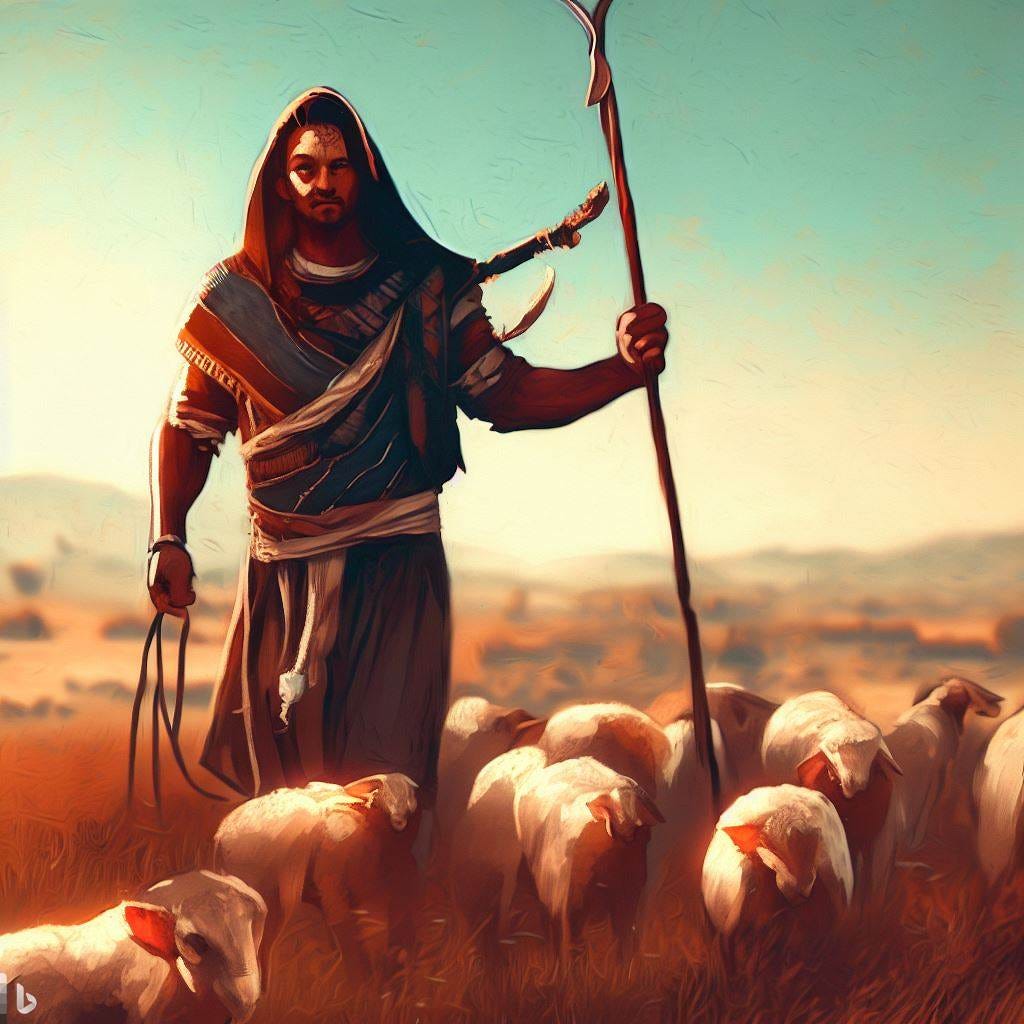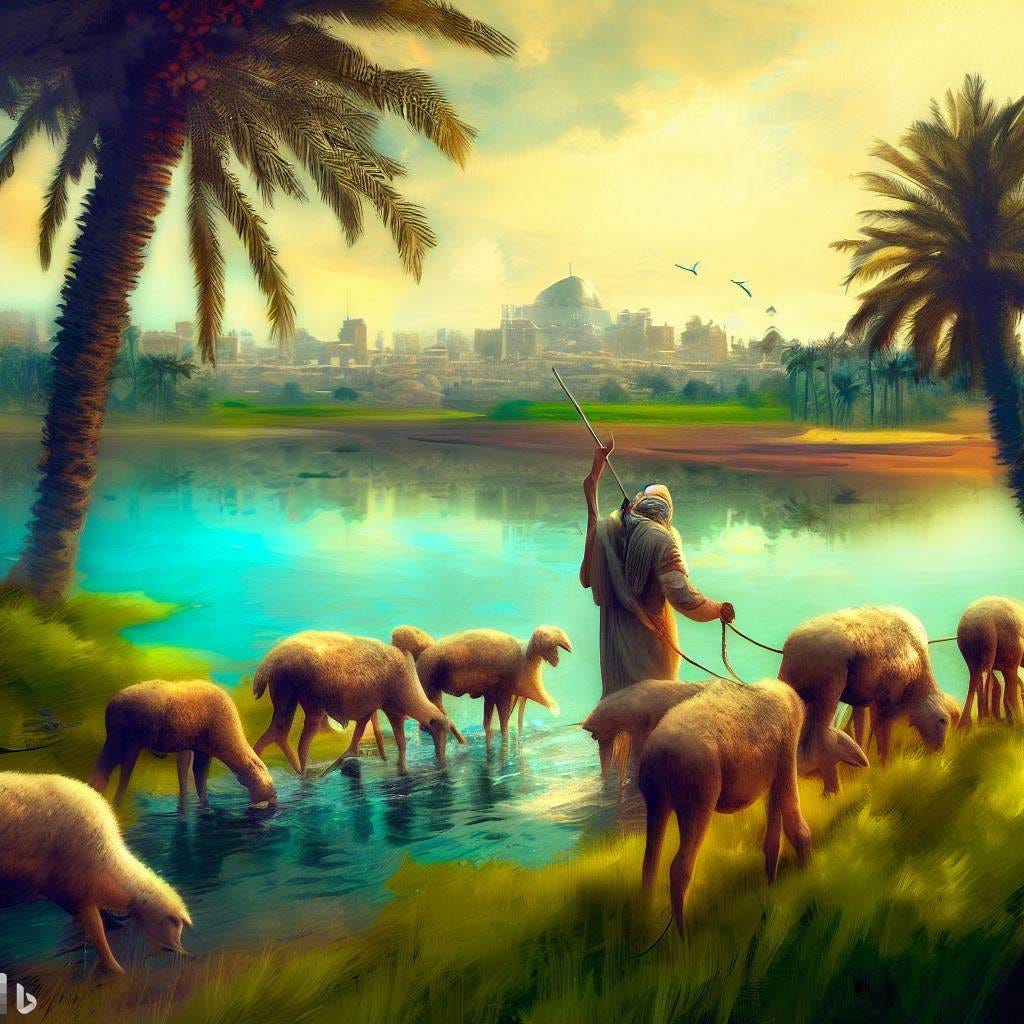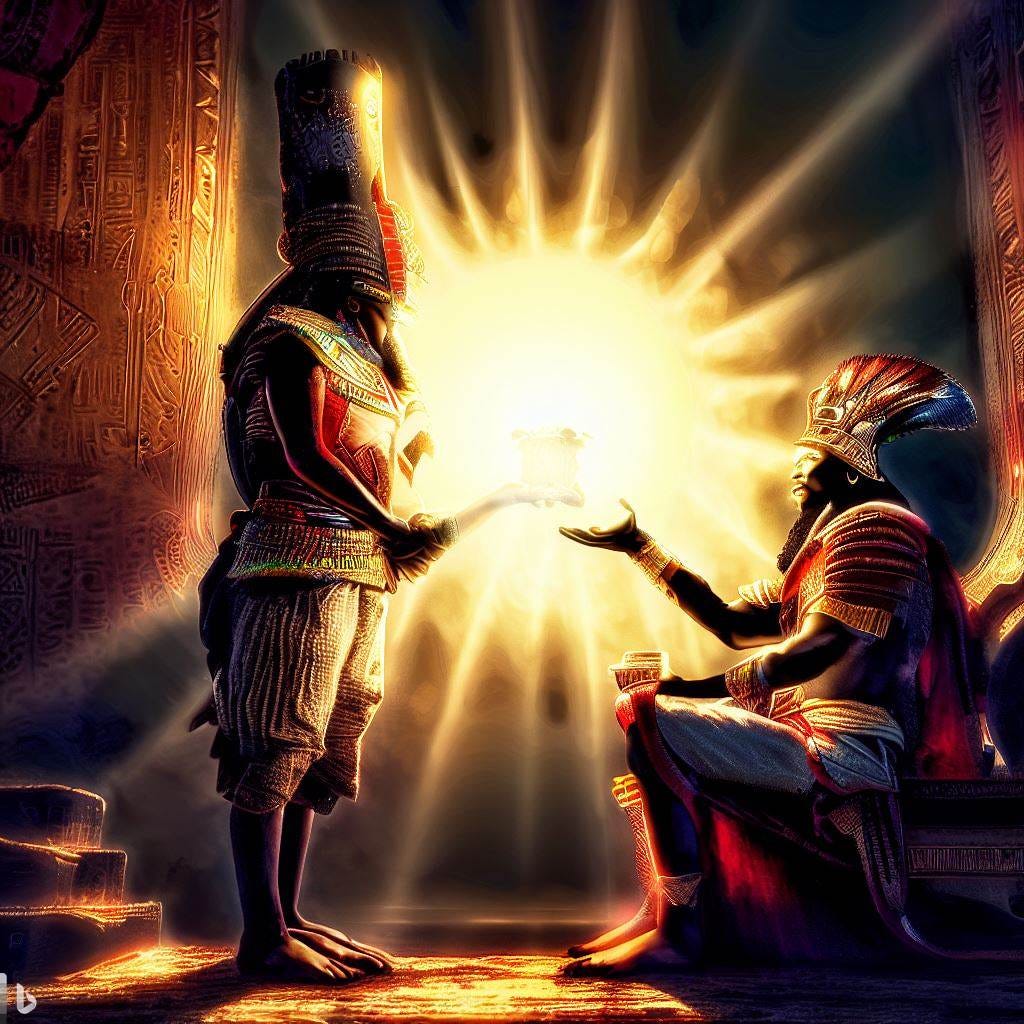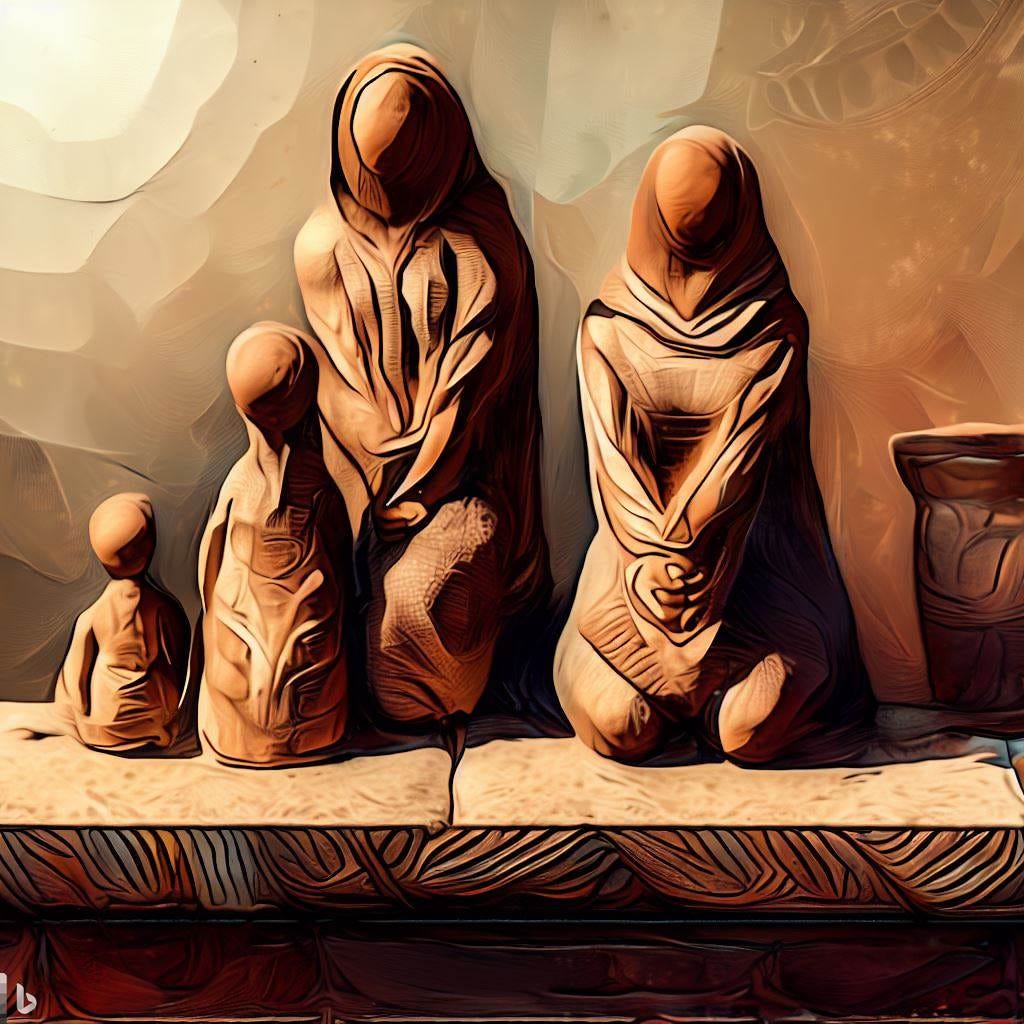The Meaning of "Sheep and Shepherd" in The Ancient World
As we delve into the rich and complex world of the ancient Near East, we cannot ignore the significance of Psalm 23 in the history of this region. This psalm, which is well-known for its comforting words and promises of protection and comfort, has its roots in the cultural and religious context of the ancient Near East.
What you need to see in Psalm 23 is what David saw throughout his life as a shepherd and gain a deeper understanding of its meaning and significance in the context of its time. This puts into perspective Christ's relationship to us and what you are in HIS eyes.
The 23rd Psalm in The Times of David
1 The LORD is my shepherd; I shall not want.
The Lord, being a shepherd of David, is a metaphor describing the authority and care exercised by a deity or a king who represents the gods.
Marduk was the chief god in Babylonia for much of its history, and a standard hymn of praise concludes by extolling his care for the weak like a benevolent shepherd.
Concerning Shamash, the Mesopotamian sun-god, a hymn identifies him as the shepherd and herdsman of all creatures.
An Egyptian hymn praises the sun-god as the “Brave Protector who tends his flocks.”
But the image not only suggested protection but was also an affirmation of the authority to rule (cf. 2 Sam. 5:2; 1 Chr. 11:2).
A coronation prayer for the Assyrian king Ashurbanipal asks that he may rule as their (the Assyrians’) shepherd.
Thus, the metaphor of shepherd was a royal one, with connotations of strong leadership but tender care. One ancient Sumerian wisdom text offers a particularly good parallel to Ps. 23 when it identifies a man’s god as one who, as a shepherd, finds good pasturage for him.
2 He makes me to lie down in green pastures: he leads me beside the still waters.
Sheep in the Levant(The Eastern Mediterranean) grazed on the fertile grass produced by rain. In the summer and autumn, they fed on weeds and stubble left over from harvest. Like camels, sheep can go long periods of time without water and then drink
as much as 2.5 gallons (9 liters). In contrast to goats, which are quite independent, sheep depend upon the shepherd to find pasture and water for them. Shepherds also provided shelter, medication, and aid in birthing. In sum, sheep were virtually helpless without the shepherd.
In an Old Babylonian text, King Ammiditana claims that the god Ea gave him the wisdom to shepherd his people. He continues the metaphor by saying that he provides them with fine pastures and watering places and makes them lie down in safe pastures.
3 He restores my soul: he leads me in the paths of righteousness for his name's sake. 4 Yes, though I walk through the valley of the shadow of death, I will fear no evil: for you are with me; your rod and your staff they comfort me.
The phrase "the shadow of death" paints a picture of a perilous and uncertain journey, one that is often depicted in sacred texts such as Job 3:5 and Isaiah 9:2. Valleys were seen as dangerous and exposed places, where a warrior was at his most vulnerable, unlike the relative safety of the high cliffs. The story of David facing Goliath in the valley is perhaps the most well-known example of this treacherous journey, and is often associated with the phrase "the valley of the shadow of death," reflecting the dangerous circumstances of their battle in the valley (1 Samuel 17:2; 1 Samuel 17:40).
The rod was a club worn at the belt, while the staff was a walking implement that doubled as a weapon in a time of need (1 Sam. 17:35) and guided and controlled the sheep. These were traditional tools of the shepherd as is shown as early as a cylinder seal inscription of the third millennium BC.
5 You prepare a table before me in the presence of my enemies: you anoint my head with oil; my cup runs over.
To set out food was a gesture of hospitality
(Gen. 18:1–8; Ex. 2:18–20). To do so in front of someone (enemies) would publicly establish the right relationship that exists between host (in this case God) and the guest (the psalmist).
Perhaps the image of Yahweh as a protective shepherd-king continues here (cf. 2 Sam. 9:7; 2 Kin. 25:27–30).
Of all the people who spoke about being anointed with oil, David has to be recalling the day that God anointed him as king in spite of all his brothers.
In the ancient Near Eastern cultures, the use of oil was frequently related to the notion of kabod, which is a term that refers to glory, and cleanliness. One notable instance of this association can be observed in the Hebrew Bible, where oil was utilized for anointing purposes, such as consecrating kings, priests, and sacred objects, thereby symbolizing divine blessing. The act of anointing was perceived as a sacred ritual that conveyed a sense of holiness, dignity, and the conferral of divine favor upon the one chosen.
Olive oil could be used to treat dry or cracked skin, so it was a sign of hospitality to offer oil to visitors. A text from an Aramaic speaking community in Egypt (c. 300 BC and related culturally to Jews) uses the word for oil to speak of invigorating an old man. In a diplomatic letter from the Assyrian king Ashurbanipal (c. 650 BC) to vassal tribes in Arabia, he boasts of his good treatment of them expressed by putting oil on their heads as an act of friendliness. Thus, the psalmist is refreshed by being in God’s presence.
6 Surely goodness and mercy shall follow me all the days of my life: and I will dwell in the house of the LORD for ever.
The house of the LORD was used as a term for the temple (which is very clear in 27:4), but never for the heavenly dwelling place of God. Forever could be confusing in regard to dwelling in the temple “forever,” but the Hebrew says only “for length of days,” i.e., for extended periods (cf. Lam. 5:20). If the translation “dwell” (Greek Septuagint of the OT) is correct, then it would suggest a priestly office for the psalmist, for priests were the only inhabitants of the temple precinct. If, instead, we should follow the Hebrew text by translating this “I will return to the house of the LORD,”, we would find here the anticipation of enjoying many future opportunities to worship at the temple (“time and again”).
The Babylonian king Neriglissar expresses to his god that he wants to be where he (his god) is forever. Another text requests, “May I stand before you forever in worship and devotion.”
The Hymn to Marduk requests that the worshiper may stand before the deity forever in prayer, supplication and entreaty.
In the third millennium BC, Sumerian worshipers tried to accomplish this objective by placing statuettes of themselves in the posture of prayer in the temple. In this way they would be continuously represented in the temple.
So, we can see that this sentiment was commonly expressed in the ancient world, regardless of which god was being worshiped.
So what is the takeaway from this psalm? Aside from the insights of the passage, what should stand out most for us is that if this is the way that gods in general were described in their relationship with humanity, then how much more should we expect our relationship with the true and living God to be so much more?
Sound familiar? Here, lemme help you.
Mat 6:26-34 LEB 26 Consider the birds of the sky, that they do not sow or reap or gather produce into barns, and your heavenly Father feeds them. Are you not worth more than they are? 27 And who among you, by being anxious, is able to add one hour to his life span? 28 And why are you anxious about clothing? Observe the lilies of the field, how they grow: they do not toil or spin, 29 but I say to you that not even Solomon in all his glory was dressed like one of these. 30 But if God dresses the grass of the field in this way, although it is here today and tomorrow is thrown into the oven, will he not do so much more for you, you of little faith? 31 Therefore do not be anxious, saying, ‘What will we eat?’ or ‘What will we drink?’ or ‘What will we wear?,’ 32 for the pagans seek after all these things. For your heavenly Father knows that you need all these things. 33 But seek first his kingdom and righteousness, and all these things will be added to you. 34 Therefore do not be anxious for tomorrow, because tomorrow will be anxious for itself. Each day has enough trouble of its own.
So to wrap up, i know the world at times is often divided and chaotic, but Psalm 23 remains a source of comfort, hope, and peace. You have to remember CHRIST IS YOUR SHEPHERD!... Think back on all the times in your life how Jesus has been ALL of those things to you, so this way you will NEVER forget who you serve and who loves you. I hope that as you continue to reflect on its ancient Near Eastern background, you will also find comfort, hope, and peace in its timeless message.
I pray this journey has been insightful, and I hope to see you in our next newsletter as we continue to explore the treasures of the The Word and The Faith.
Main Source: Cultural Backgrounds study bible
Till next time










